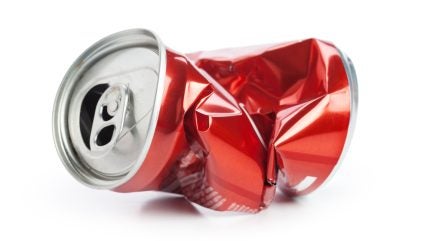
European aluminium producers have warned that unchecked scrap exports could undermine recycling capacity and affect supply chains critical to the packaging industry.
The call comes as the EU moves forward with its Carbon Border Adjustment Mechanism (CBAM), which targets carbon-intensive imports but does not address the export of recycled materials.

Discover B2B Marketing That Performs
Combine business intelligence and editorial excellence to reach engaged professionals across 36 leading media platforms.
Pressure on recycled aluminium supply
Recycled aluminium plays a central role in packaging production, where demand is rising due to its lightweight properties and potential for infinite reuse. About 40 per cent of aluminium consumed in Europe—roughly 5 million tonnes each year—already comes from recycled sources.
Over the past decade, companies have invested around €700 million in new furnaces, plant expansions and process upgrades, boosting capacity by an additional 1 million tonnes annually.
Despite these investments, about 15 per cent of European recycling capacity lies idle. Industry representatives point to high levels of scrap exports, which reduce the availability of feedstock for European recyclers and threaten the steady supply needed for packaging manufacturers.
Industry calls for export restrictions
European Aluminium, the association representing the sector, has urged the European Commission to consider a tax on scrap exports.

US Tariffs are shifting - will you react or anticipate?
Don’t let policy changes catch you off guard. Stay proactive with real-time data and expert analysis.
By GlobalDataThe group argues that recycling is Europe’s competitive advantage in meeting climate goals, given that producing aluminium from scrap requires far less energy and generates lower emissions compared with primary production.
Without stronger measures, the industry fears that packaging producers could face material shortages, undermining efforts to scale up sustainable packaging solutions across Europe.
Impact on packaging sustainability goals
The packaging industry relies heavily on secondary aluminium to meet both regulatory and consumer demand for low-carbon materials.
With global markets competing for scrap, the EU risks losing a resource that is essential to reducing emissions and advancing circular economy targets.
Industry observers note that while CBAM addresses imports of carbon-intensive aluminium, the absence of provisions on scrap exports creates a policy gap.
For packaging producers, this could mean rising costs, greater dependence on imports, and a setback in meeting sustainability commitments.
The European Commission has not yet indicated whether scrap export measures will be introduced, leaving packaging manufacturers and recyclers uncertain about the future availability of recycled aluminium.





